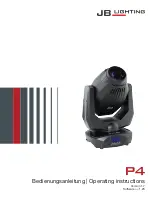
A
F
Fiig
gu
urre
e 3
38
8 –– C
Ch
ha
arrg
giin
ng
g tth
he
e b
ba
atttte
erryy
E
Elle
eccttrriicca
all p
po
ow
we
err rre
eq
qu
uiirre
em
me
en
nttss
For reliable and effective operation, reference the following electrical power requirements when you configure the electrical
power source for the charger.
P
Po
ow
we
err ttyyp
pe
e
O
Op
pe
erra
attiio
on
na
all
vvo
olltta
ag
ge
e rra
an
ng
ge
e
F
Frre
eq
qu
ue
en
nccyy
M
Ma
axxiim
mu
um
m
ccu
urrrre
en
ntt d
drra
aw
w
S
Stta
an
nd
db
byy ccu
urrrre
en
ntt
d
drra
aw
w
L
Lo
ow
w vvo
olltta
ag
ge
e ssh
hu
utt
o
offff
AC
100-240 VAC, 50/
60 Hz, 1A
50/60 Hz
< 1.2A
< 50 mA
90 VAC
DC
12-34 VDC, 5A
Not applicable
< 6.67A
< 150 mA
10 VDC
C
Ch
ha
arrg
ge
err sse
ettu
up
p
During setup, place the charger in an environmentally controlled location that is:
•
Free of dust and moisture
•
Kept within a constant temperature range (see
•
Readily accessible for use
Locate and maintain the power supply and power cords to minimize the risk of damage and inadvertent disconnections.
S
Se
eccu
urriin
ng
g tth
he
e m
mo
ou
un
nttiin
ng
g p
plla
atte
e o
op
pttiio
on
n
W
WA
AR
RN
NIIN
NG
G
•
Always have a certified mechanic, familiar with ambulance vehicle construction, secure the mounting plate option and
charger.
•
Always make sure that the mounting plate option is secured to the surface before use.
To secure the mounting plate to a surface (Figure 39):
1. Use the mounting plate as a template to mark the location of the mounting holes (A).
2. Position the mounting plate and check that the:
a. Spring tab (B) is located at the rear of the charger.
N
No
otte
e -- When mounting to a vertical surface, the spring tab should be horizontal and pointed to the left.
EN
50
6507-009-001 Rev AB.3
















































